A life less ordinary at the Fox River Commune
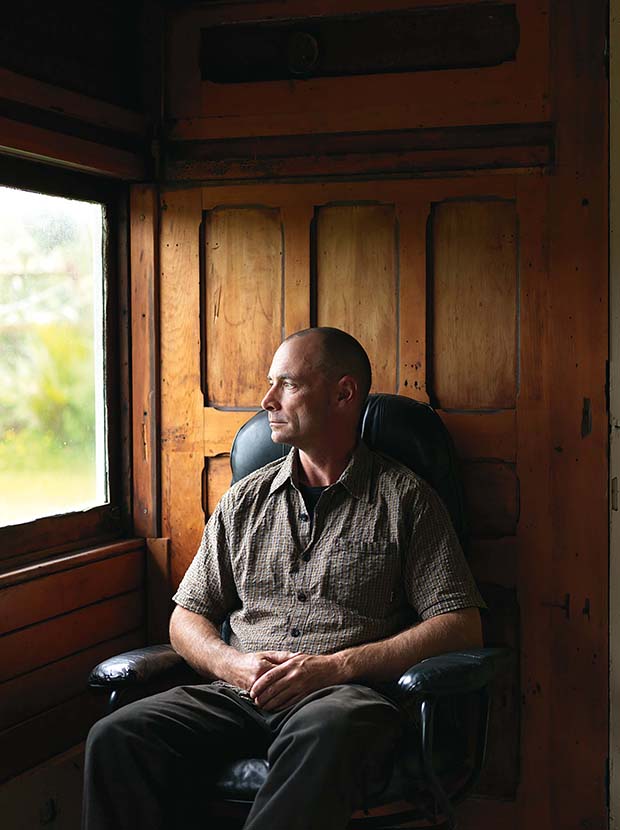
The times may be a changing but the Fox River Commune on the West Coast still attracts a colourful group of thinkers, dreamers and creators.
Words: Cheree Morrison Photos: Jane Ussher
This article was originally published in the May/June 2016 issue of NZ Life & Leisure.
In a topsy-turvy home perched on the side of a wind-battered West Coast there is a dust-covered CD lying on a shelf next to a faded calendar from 2011. Its title and the name of the artist are just visible – Shine On by The Windy City Strugglers. It suits this place – this chilly, tough place – and the people who call it home. They’re a resilient bunch but then they’ve had to be.
There is nowhere quite like Katajuta, or the Fox River Commune, as it’s known. It’s a lot quieter now than it was in its heyday. These days it’s home to the last of the hippies, a term the residents have long made peace with.
Jed Smith is one of the original Fox River occupants. His parents Ross and Mary were one of the three founding couples who purchased the 150-odd-hectare property for $6000 back in 1971. It became a haven for those seeking deeper meaning, an escape from being “straight”.
Their idea of living off the land was either super backward or very forward, depending on who was judging. People came and went and, as they continued on their way, they spread tales of parties, of a good and uncomplicated life. Everyone shared; makeshift dwellings were swapped, more were built, many burnt down.
The commune attracted the thinkers, the dreamers and the creators to the area. Filmmaker Geoff Murphy and theatre cooperative BLERTA (Bruno Lawrence’s the Electric Revelation and Travelling Apparition); the locals became used to appearing in films like Wildman.
To Jed the visitors were like rock stars, in their prime, fabulous and never straight. It wasn’t always easy – nature was tough on those who lived in this place. There were more emotional, personal battles than the free-love and tie-dye stereotype suggests. Money tended to tear things apart, and it was better when there wasn’t much of it.
Those who remain are characters. Determined, hardy, slightly weatherworn, incredibly welcoming. At just $20 a week, the commune is an affordable retirement option.
Residents joke of turning one of the homes into an old-folks unit in future, but the younger generation have bigger plans, some of which are underway. Jed learnt years ago that with hippies good things take time.
JED SMITH
The ideas man
When Jed Smith (above) was growing up, he would have given anything to be a white-bread kid. But instead of fluffy white carbohydrates, his lunch box rattled with cheese, nuts, and raisins. He stood out. Even as a primary schooler, Jed knew that growing up at the Fox River Commune was a life a little less ordinary.
Ordinary would have been nice.
Living in a train carriage, driving old bombs, having endless people coming and going, eating seal and possum… not so normal. Rowing bathtubs around during floods and being rescued by helicopter after getting trapped in the bush for several days without food or water (they ate all the liquorice on day one) because the adults forgot to check the weather report… not so normal. He saw it all and it was all there to be seen.
Jed’s childhood days of viewing the commune as embarrassing are long gone – now he knows it’s his biggest asset. He’s come and gone over the years. His two daughters were raised here for a bit but now live with their mum in Westport, and there was a stint in Australia.
Since the mid-1990s he’s been living and working in the area in mining redevelopment and forestry (he’s planted over a million trees and counting so far during his career), but when he hit a midlife speed bump about nine years ago, the timing was right to return to his roots. Mum Mary left years earlier and now owns the Rosy Glow Chocolate Shop in Collingwood. But his dad Ross is still in the area and Jed’s siblings, Miro and Miriam, are frequent visitors, especially Miro who owns a carriage at the commune and rents it out on BookaBach.
Jed’s an ideas man. Some stick, some don’t. Some work, others don’t. By the time he’s halfway through one, the next is already forming, rolling around and gathering speed.
Sometimes it overtakes his current ambition (developing an off-the-grid retreat known as The Hexagon), which is when his partner, Jodene, gently reins him in. The Hexagon began as Jed’s dream project, but became a shared passion and he couple have spent hours finding the perfect finishing touches.
Jodene’s a secret hippy.
She once flew to Tonga with only a bikini as luggage and spent two years making a nuisance of herself by purchasing turtles from the local markets and releasing them back into the ocean.
They’ve just completed work on their second accommodation offering, Sva’s Hut, and Jed’s already onto the next thing.
His big dreams involve ecotourism, carbon credits, walking tracks, art installations… the list goes on. Would he call himself a hippy? “At heart. But these days we go to The Warehouse just like everyone else.”
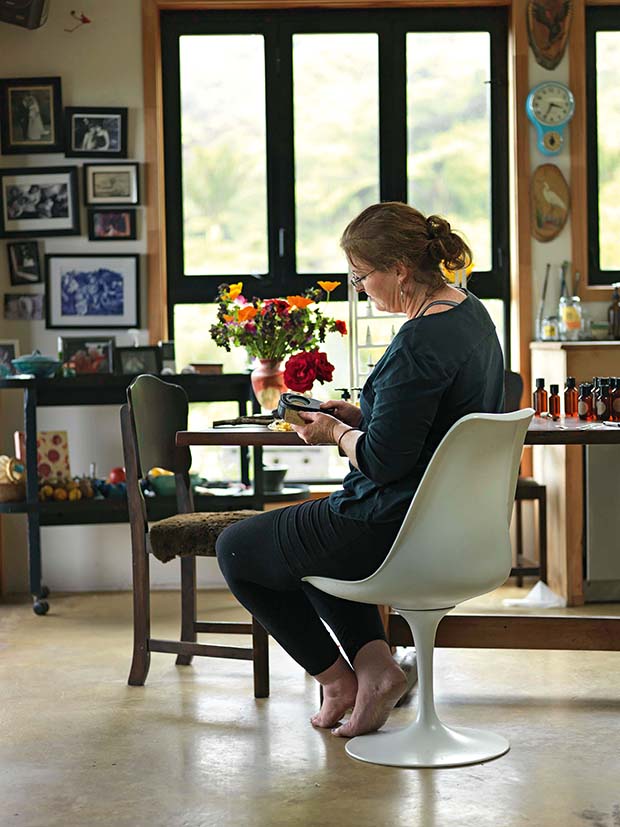
FIONA McDONALD, JONY AND SON REEF
The one that got away
Dinosaur skin makes excellent flooring. Tough, durable, thick. Repurposed from a film set, the sturdy material has withstood Reef’s running around for the past six years.
It’s probably not where the makers of The Lost World expected their creation to end up, as a doormat outside the house that Jony built, but welcome to the West Coast. Expect the unusual.
Fiona has been a proper Coaster since she was 24, when her partner, Jony, who is a builder, constructed their first home just up the road from Katajuta. Like most, it started as a caravan, and then evolved from there. They’ve since moved up the driveway to a new hand-built home, but the original still stands, covered in a glowing blanket of passion-fruit vines.
It’s now a sort-of playroom, where the couple’s son, Reef (a young rebel in his Sea Shepherd T-shirt), and Fiona regularly meet with a group of other home-schooled or correspondence children from around the region.
Good luck finding a swing or slide in the area, and it’s not only children but also the local blue penguins that can’t cross the road to the beach without taking their life into their hands. So the mums have come up with Funday Friday.
Making the most of it is what’s done around here. Fiona’s used to it, though some days are easier than others.
She lived at Fox River for a year in the early 1990s; it was before she met Jony and back then everyone was a little younger and very cool. But the characters came and went like the tides, and after a year bunking down with her friend, Susie, she moved out to her own patch of coast. Jony had a near-fatal brain aneurysm when Reef was nine months old but, together, they’ve fought their way back to near normalcy (or as near as it can be with dinosaur-skin doormats).
Jobs ebb and flow; both have worked in the film industry, Jony in lighting and Fiona in location scouting and prop making. But when the film wraps, it’s time to roll another reel. Fiona laughs at the thought of wearing a uniform, it’s not for her.
She’s an artist of many mediums, from paint and brush to jewellery, hand-crafted copper spoons or handmade natural skin care, selling her wares at local markets and online under the brands Fox River Bath Co and Brightonmine.
When the skies are as cloudy as the coast, silver linings can be harder to see,
but those who persevere find them. The combination of Jony’s aneurysm and Fiona’s home-based work has allowed them to spend precious time with Reef, who in turn has the world’s best playground on his back doorstep. Mother Nature really pulled out all the stops on the coast, and the community support is like no other.
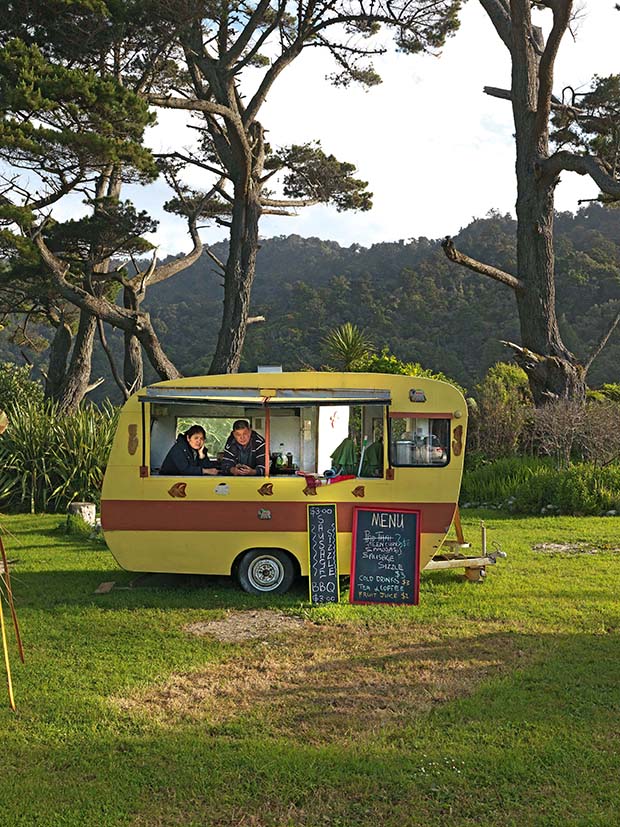
BILLY AND WOW McMASTER
The content couple
Billy McMaster has been at Fox River since he was 22 years old. That’s 42 years, if you must know. He thinks it’s an easy life, but knows that’s not what everyone would say. He doesn’t mind people, old Bill, but he prefers it when they aren’t around. That’s why he doesn’t mind the sand flies and the shitty weather – it keeps the people away.
He’s been here since everyone got around on horse and cart or in the one car – gas was too expensive to go very far. A cow, a goat, some Tilley lamps, a wheat grinder and a vege garden … it’s all that was needed. They were young and it was fun.
No one was running around wearing beads and smoking pot (note: this point is debatable). They loved meeting Coasters who grumbled about the damn hippies, then changed their minds about them. Hey, they aren’t so bad, they’d walk away saying. The people here are great people, generous people. Always have been. Billy’s friend Jaylene’s grandfather used to walk past their place, stick his head in and say “wake up you silly hippies” then pop a crayfish on the windowsill.
It was the other Bill (Hartley) who convinced him to come here all those years ago – they used to be neighbours in Christchurch. Both are still here but in different homes and life has changed. Bill now has his wife, Wow, and her teenage son, Om.
They met in Thailand, so moving here was quite the adjustment for Wow. But she loves it. She has her ducks that follow her around the property and Wow’s Cafe at the Sunday market. Om found a job quickly, despite his limited English. Like ducks to water, all of them.
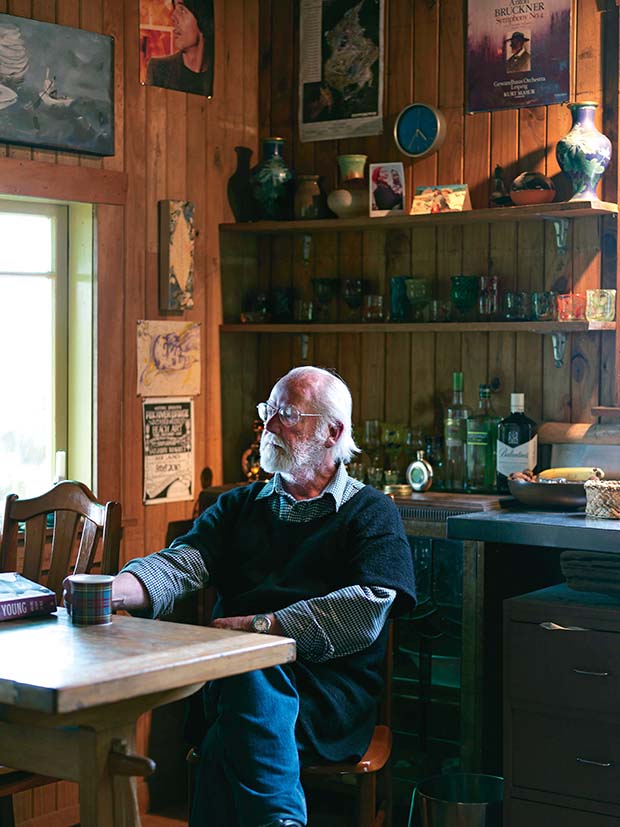
BILL HARTLEY
The theorist and environmentalist
Bill’s home is quintessentially Bill. From the country album covers and sun-faded photos of the gold-mining days, to the piles of books teetering in every corner, it’s a collage of all that’s golden. There isn’t too much stuff – only the things that matter to Bill were removed from his quake-damaged home in 2012 and brought to here to Fox River, his new sanctuary. The Christchurch house is still being repaired. Don’t mention EQC.
It was an unplanned return but a welcome one. Bill grew up in Westport and the Fox River area was his holiday home. He was the third child and so as long as he showed up for dinner, no one asked questions. He went all the places he shouldn’t.
He returned to the coast over the years, in between obtaining his zoology degree (he started his PhD but found his ideals clashed with that of the university authorities), raising a family and working in the immunology lab at Christchurch Hospital and then at Agrium Technologies, manufacturing environmentally friendly biological pesticides.
He’d spent time at both the Fox River Commune and an earlier one on the opposite side of the river, and it was he who convinced old neighbour Billy to head over in the 1970s.
“A hippy was someone wanting to take a different direction to the norm. It’s more mainstream now, but we were living off the land, growing our own food. It was the era of pesticides so were wary of chemicals, but again, now that’s normal. It was more about people getting together and having fun. Music, sex, drugs and rock ’n’ roll. Well, hardly any drugs… though there was one time with a travelling monk and animal-shaped mounds of hash…”
They were the old days but not the best days – the new ones are better. Bill has no doubt that Fox River is the best place in the world. He still likes to challenge the thinking of the mainstream – he has definitive theories on global warming – but his main focus is exploring his near-limitless backyard.
The grandkids pop over from time to time. They start picking up flowers and wave-smoothed stones before they’re completely out of the car. After years of family and career, he’s happy with the commune lifestyle. “The system of all voting and group meetings works. It’s nice to not be solely responsible for decisions and to be able to work alongside, and help, other people.”
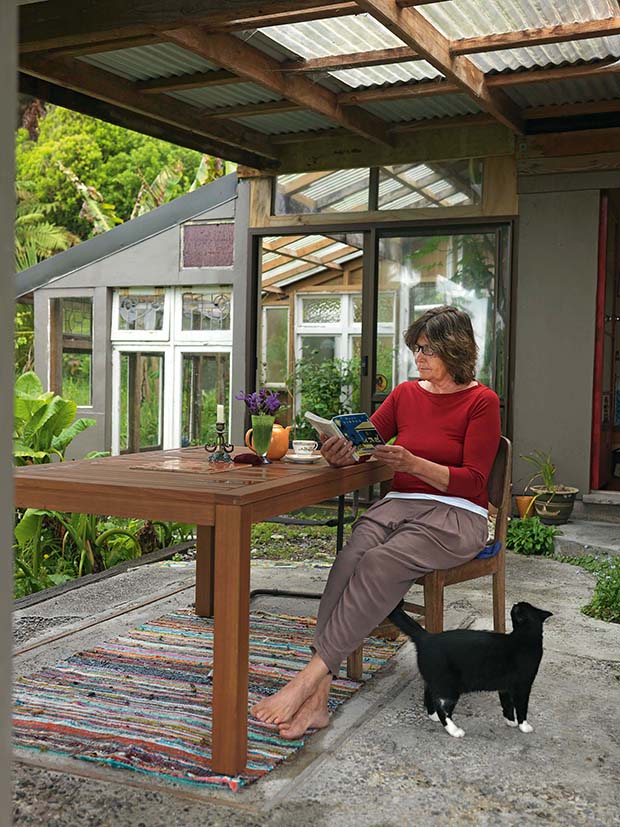
SUSIE PRINGLE
The Matriarch
Once upon a time, Susie Pringle jumped in a car and headed for a party at Fox River (the premiere of Wildman, she thinks). She left her dairy-farmer husband at home.
That was in 1976, and she’s been at Katajuta on and off ever since. She never went home. It turns out that the straight life – meaning the norm or typical, rather than sexual orientation – wasn’t for her.
Her mother, of course, was completely horrified, joining a group of parents nationwide whose children had run away to communes and were living in wonky, leaking, windswept accommodation. It was the 1970s after all.
“We made do,” says Susie. “The cost of living was low, around $10 a week, and we worked together, shared what we had. It was much more communal back then. We had kids around the same age and people would wander in and out of each other’s places, eat their food and fall asleep where they stopped.
“The roads were quiet, homes were cheap. You didn’t have to look far to find a character. I have mixed memories of the old days – there were some weirdos. There was no vetting process and we were very, very tolerant, until you crossed a line. Violence was the one thing not accepted, go there and you were gone. I often thought about leaving and often did … even now I still think it sometimes.”
Over the years Susie has often left this part of the world, shifting through New Zealand and the United Kingdom, but she always finds herself drawn home. She still disappears.
When not working as a teacher, a disabled or aged carer, or in retail in Punakaiki (the best drive to work in New Zealand), she’s working elsewhere. So what does she love? “This, the environment, the view. It’s my absolute favourite thing. It’s hard. Here nature works against you, not giving an inch. There’s a heaviness. But it’s home.”
Love this story? Subscribe now!
 This article first appeared in NZ Life & Leisure Magazine.
This article first appeared in NZ Life & Leisure Magazine.

